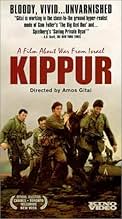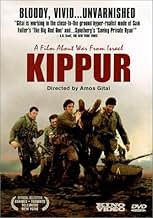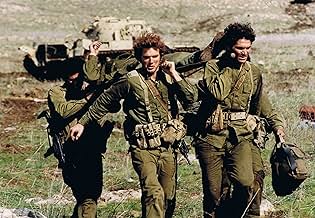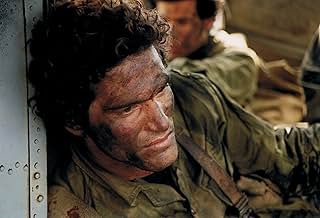When the Yom Kippur War breaks out, two Israeli soldiers find themselves unable to locate their unit. Eager to take part in the war effort, they join an airborne medical evacuation unit.When the Yom Kippur War breaks out, two Israeli soldiers find themselves unable to locate their unit. Eager to take part in the war effort, they join an airborne medical evacuation unit.When the Yom Kippur War breaks out, two Israeli soldiers find themselves unable to locate their unit. Eager to take part in the war effort, they join an airborne medical evacuation unit.
- Awards
- 2 wins & 6 nominations total
Uri Klauzner
- Dr. Klausner
- (as Uri Ran-Klausner)
Juliano Mer-Khamis
- The Captain
- (as Juliano Mer)
Liat Glick
- Dina
- (as Liat Glick Levo)
Noah Faran
- Rescue Commander
- (as Noach Faran)
- Director
- Writers
- All cast & crew
- Production, box office & more at IMDbPro
6.32K
1
2
3
4
5
6
7
8
9
10
Featured reviews
Misunderstood
Those here who have bashed the film have grossly misunderstood Kippur. Either they look for a blow-blam-bang Holy-wood flick, which it isn't; or for a highly reliable reconstruction (which Save Private Ryan, extolled by some, is only in part: the first scene is almost like-it-really-was, the last scene is blow-blam-bang with Matt Damon and Tom Hanks instead of Chuck Norris and Steven Seagal). Kippur is a highly personal film, in that war is filtered through the very personal point of view of a sophisticated director. Amos Gitai is close to Antonioni; and in directing a war movie he couldn't forget the Lesson of the Master. Hence the minimal dialogue, hence the dilated times, hence the attention to the setting more than the characters. You try to watch Deserto rosso and then Kippur and you'll notice just how much they have in common. Then, if you don't like Antonioni, it's your own business, go for the blow-blam-bang stuff. However, as for action movies, I think Black Hawk Down is better than SPR. I may be wrong...
Rosencranz and Gildenstern of the war set
When the siren sounds the two main characters head off to do their part for the Israeli state. The bookends on the movie place the context of war as an eventuality that, like working, has to be done. The action doesn't take place at the front but with a medical evac unit who's cleaning up the wounded after the action has moved on. My two reasons for liking this film are the creative camera work and the battlefield sounds and visuals. Early in the film when they're looking for their unit they do accidentally drive right into the front lines and the viewer (camera) is placed right in the back seat of their Fiat as they scramble to get turned around. My one complaint. The characters lack development. Overall an enjoyable film.
Visual Meditation on Commuting to the Front Lines
As an Israeli's view of war, "Kippur" takes "Thin Red Line"s visual approach, with little plot or explication or context, from the sacred (Yom Kippur mis en scene) to the procreative beginning, to the wounds and exhausted faces of the soldiers.
This is a war where a soldier takes his used Fiat right up to the front and back again to his girlfriend's front door. Unlike "Tigerland" where the soldiers are young neophytes with taut basic training bodies, these are lean, lanky, long-haired chain-smoking, experienced reservists who pretty much pick and choose where they'll serve. Instead of the usual U.S. barking sergeant, this unit is based on long-term friendship, training, coordination, shared goals and consensus. Fodder for discussion on military management styles. And I can't think of another war movie where a guy named Weinraub is as sexy looking.
Even my husband, who is a devotee of the War Channel and thought it was way too arty (and amazingly this was from the same director who did the agit-prop anti-Orthodox domestic drama "Kadosh") found one long sequence with almost no dialog very effective, as the medics try to rescue the wounded in the mud.
The projectionist shut down the credits before it was finished.
(originally written 12/2/2000)
This is a war where a soldier takes his used Fiat right up to the front and back again to his girlfriend's front door. Unlike "Tigerland" where the soldiers are young neophytes with taut basic training bodies, these are lean, lanky, long-haired chain-smoking, experienced reservists who pretty much pick and choose where they'll serve. Instead of the usual U.S. barking sergeant, this unit is based on long-term friendship, training, coordination, shared goals and consensus. Fodder for discussion on military management styles. And I can't think of another war movie where a guy named Weinraub is as sexy looking.
Even my husband, who is a devotee of the War Channel and thought it was way too arty (and amazingly this was from the same director who did the agit-prop anti-Orthodox domestic drama "Kadosh") found one long sequence with almost no dialog very effective, as the medics try to rescue the wounded in the mud.
The projectionist shut down the credits before it was finished.
(originally written 12/2/2000)
The Trauma of the October War - Excellant
I disagree with most of the comments of the other commentors. This film is not a "History of Yom Kippur War" It is a very realistic attempt to see the war through a personal eyes of a Reserve Soldier suddenly called up and "Thrown" in to a War. It is 30 years since that war which is contraversial in Israel because we were caught by surprise by Egypt and Syria. On the other side within less than a month the Israeli army was 30 KM from Damascus and 100 KM from Cairo. I know people killed in that war and like other Israelis think "Kippur" shows the Trauma of that War, And any War. I have visited Egypt a number of times and Hope that, as Saadat said "The October War should be the Last War...". This is my "Apocalypse Now" movie but much more realistic.
"Every minute of silence is a great treasure to me..."
Kippur (2000) Directed by Amos Gitai Starring: Liron Levo, Tomer Russo, Uri Klausner, Yoram Hattab, and Guy Amir ***1/2 out of 5 stars
Forgive me if I see the good in everything, but I believe that this Israel film, which features excruciatingly long takes and little dialogue, DOES have some deep significance. However, the long takes ARE draining, yet when you realize the purpose, it all seems to make sense.
Based on Israeli filmmaker Amos Gitai's personal experiences in the Yom Kippur war in 1973, in which Egyptian and Syrian forces attacked Israel on their holy day of Yom Kippur, "Kippur" follows a search and rescue team of four people as they travel by helicopter to different war-torn areas to find as many people alive as possible and bring them to some sort of safety and medical treatment. The film begins with two characters, Ruso (Yes, Russo) and Weinraub (Levo), who find themselves abruptly trying to get into a war. One of the characters (Ruso, I believe) is eager to get to the battlefront, proclaiming that a war has finally reached their generation and that "it is ours!". You must understand that Israel has been going through a war at least once, if not twice a decade. So, war, to the naive, inexperience individual, seems like a rite of passage.
Ruso and Weinraub, after awkwardly entering the front lines and being told to go back as shells are heard closeby, stop on the side and meet up with Gadassi (Amir), a medical officer trying to find a ride to the mission briefing. When they finally get to the battlefield to start the search and rescue, you soon find out that the film is about the death, detachment, and irrationality of war. What began as a rite of passage for the characters ended up being a strange, tortured nightmare. They go from area to area finding amputees and dead soldiers, usually unable to help all and having to leave much of the bodies on the battlefield. One torturous take follows the four characters as they try to help a soldier, who is hurt and obviously alive, out of a big field of mud. As they fall and slip, the soldier's body is thrown around, unintentionally carelessly. The frustration takes over one of the soldiers helping him as he breaks down in the middle of the mud and the doctor is going back and forth trying to calm the panicking soldier and help the injured one. When they finally make it to some other officers waiting for them to take the soldier away, he is already dead and the helplessness on the soldier's muddy faces says it all.
This film can be and will be very draining for most viewers. The long takes and the often far away framing distances ourselves from the action and you should soon learn to explore and examine what Gitai is trying to convey through the characters' stories. The film DOES build up to a briefly explosive climax, which poetically brings everything full circle for the soldiers. "Kippur" is a difficult film appropriate for its difficult subject. It is also daring, unwavering in its message, and, most importantly, truthful to the nonsense that war really is.
Forgive me if I see the good in everything, but I believe that this Israel film, which features excruciatingly long takes and little dialogue, DOES have some deep significance. However, the long takes ARE draining, yet when you realize the purpose, it all seems to make sense.
Based on Israeli filmmaker Amos Gitai's personal experiences in the Yom Kippur war in 1973, in which Egyptian and Syrian forces attacked Israel on their holy day of Yom Kippur, "Kippur" follows a search and rescue team of four people as they travel by helicopter to different war-torn areas to find as many people alive as possible and bring them to some sort of safety and medical treatment. The film begins with two characters, Ruso (Yes, Russo) and Weinraub (Levo), who find themselves abruptly trying to get into a war. One of the characters (Ruso, I believe) is eager to get to the battlefront, proclaiming that a war has finally reached their generation and that "it is ours!". You must understand that Israel has been going through a war at least once, if not twice a decade. So, war, to the naive, inexperience individual, seems like a rite of passage.
Ruso and Weinraub, after awkwardly entering the front lines and being told to go back as shells are heard closeby, stop on the side and meet up with Gadassi (Amir), a medical officer trying to find a ride to the mission briefing. When they finally get to the battlefield to start the search and rescue, you soon find out that the film is about the death, detachment, and irrationality of war. What began as a rite of passage for the characters ended up being a strange, tortured nightmare. They go from area to area finding amputees and dead soldiers, usually unable to help all and having to leave much of the bodies on the battlefield. One torturous take follows the four characters as they try to help a soldier, who is hurt and obviously alive, out of a big field of mud. As they fall and slip, the soldier's body is thrown around, unintentionally carelessly. The frustration takes over one of the soldiers helping him as he breaks down in the middle of the mud and the doctor is going back and forth trying to calm the panicking soldier and help the injured one. When they finally make it to some other officers waiting for them to take the soldier away, he is already dead and the helplessness on the soldier's muddy faces says it all.
This film can be and will be very draining for most viewers. The long takes and the often far away framing distances ourselves from the action and you should soon learn to explore and examine what Gitai is trying to convey through the characters' stories. The film DOES build up to a briefly explosive climax, which poetically brings everything full circle for the soldiers. "Kippur" is a difficult film appropriate for its difficult subject. It is also daring, unwavering in its message, and, most importantly, truthful to the nonsense that war really is.
Did you know
- TriviaThe film is based on director Amos Gitai's own experience of joining a helicopter rescue crew during the war of Kippur, and his helicopter being shot down by a Syrian missile on his 23rd birthday.
- GoofsMoshe Dayan did NOT lose his eye in the Sinai Desert; he lost it in Vichy-controlled Lebanon in 1941 on a reconnaissance mission on behalf of the Australian/British Army.
- ConnectionsFeatured in Sodankylä Forever: Elokuvan vuosisata (2010)
- How long is Kippur?Powered by Alexa
Details
- Release date
- Countries of origin
- Official sites
- Languages
- Also known as
- Киппур
- Filming locations
- Nehushtan, Tel Aviv, Israel(studio: house interiors)
- Production companies
- See more company credits at IMDbPro
Box office
- Gross US & Canada
- $114,283
- Opening weekend US & Canada
- $17,007
- Nov 5, 2000
- Gross worldwide
- $114,283
- Runtime
- 1h 57m(117 min)
- Color
- Sound mix
- Aspect ratio
- 1.85 : 1
Contribute to this page
Suggest an edit or add missing content
































